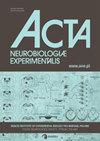光学相干断层扫描显示小鼠光血栓性中风后缺血区域的脑组织和血管的异质性。
IF 1.4
4区 医学
Q4 NEUROSCIENCES
引用次数: 0
摘要
我们使用定制的原型高斯光束光学相干断层扫描(OCT)装置演示了光中风后小鼠大脑缺血区域的体内成像,其中近红外成像光束和绿色光诱导光通过相同的物镜。我们的研究目的是分析脑卒中2周进展过程中缺血性区域的血管状况,并将低反射和高反射OCT散射区域与激活的小胶质细胞和星形胶质细胞的位置联系起来。血管生成,用血管图评估,显示缺血中心血管面积增加,直到第7天。OCT成像显示缺血区呈非均匀散射信号。在结构OCT图像上,我们发现缺血的核心区域存在低反射OCT信号和核心周围的高反射信号晕。到第14天,核心信号的大小减少了70%。免疫细胞化学显示,缺血核心的低反射区与小胶质细胞/巨噬细胞活化有关,而晕区的高反射信号来自活化的星形胶质细胞。本文章由计算机程序翻译,如有差异,请以英文原文为准。
Optical coherence tomography reveals heterogeneity of the brain tissue and vasculature in the ischemic region after photothrombotic stroke in mice.
We demonstrate in vivo imaging of the ischemic area in the mouse brain after photostroke using a custom prototype Gaussian‑beam optical coherence tomography (OCT) setup in which the near infrared imaging beam and the green photoinducing light pass through the same objective lens. The goal of our research was analysis of vascularity of the ischemic area during 2‑week progress of stroke and correlating the hypo‑ and hyperreflective OCT scattering areas with the location of activated microglia and astroglia. Angiogenesis, which was assessed using angiomaps, showed that the area of vessels in the ischemic center increased until day 7. OCT imaging revealed a heterogeneous scattering signal pattern in the ischemic area. On structural OCT images, we found presence of a core area of ischemia with a hyporeflective OCT signal and a halo of hyperreflective signal around the core. The core signal decreased in size by 70% by day 14. Immunocytochemistry revealed that the hyporeflective area in the ischemic core was associated with microglia/macrophage activation, whereas the hyperreflective signal from the halo came from activated astrocytes.
求助全文
通过发布文献求助,成功后即可免费获取论文全文。
去求助
来源期刊
CiteScore
2.20
自引率
7.10%
发文量
40
审稿时长
>12 weeks
期刊介绍:
Acta Neurobiologiae Experimentalis (ISSN: 0065-1400 (print), eISSN: 1689-0035) covers all aspects of neuroscience, from molecular and cellular neurobiology of the nervous system, through cellular and systems electrophysiology, brain imaging, functional and comparative neuroanatomy, development and evolution of the nervous system, behavior and neuropsychology to brain aging and pathology, including neuroinformatics and modeling.

 求助内容:
求助内容: 应助结果提醒方式:
应助结果提醒方式:


